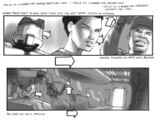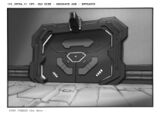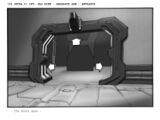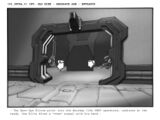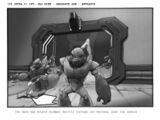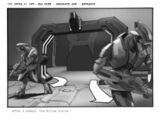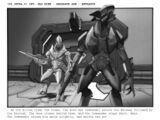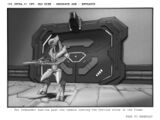Halo 2 storyboards
From Halopedia, the Halo wiki
 This article is a stub. You can help Halopedia by expanding it.
This article is a stub. You can help Halopedia by expanding it.
This article is part of a series on
Halo 2 cut content
- Cut content
Early script
Cut dialogue
Cut enemies and ambient life
Cut equipment
Cut gamemodes
Cut levels
Cut vehicles
Cut weapons
- Development
Halo 2 development
Concept art
Design documentation
Storyboards
Title updates
E3 campaign demo
E3 multiplayer demo
To check out cut content for other Halo games, see here!
The Halo 2 storyboards consist of the early drafts and ideas produced for Halo 2's story. The storyboards were created by Lee Wilson, with some additional work by Joseph Staten.
Overview
- " I am Lee Wilson, and yes I did do the storyboards for Halo 1, 2, and 3. Halo 1 were all on paper like traditional movie shooting boards. Halo 2's story went through a lot of changes and so I ended up doing them in a comic panel style, since we weren't in a place to do shooting boards. Halo 3' boards I did in color to work out the lighting and inform my final cinematic lighting. By Halo: Reach, I was directing the story and cinematics, so they were mostly scribbles and notes in various notebooks. It's certainly a trip down memory lane, and I little tough to look at some of my old artwork."
- — Lee Wilson discussing his work on Halo 2, in a comment on YouTube.[1][2]
When Lee Wilson started the storyboards, it was clear to him that the script was not ready for shooting boards due to the numerous script revisions at Bungie. This lead to Lee boarding up the entire cinematic script two to three times. What he opted to do was present the boards in a hybrid storyboard/comic panel style, drawing them in pen to "remove the temptation of erasing and redrawing them until they looked good to me". These boards were for simple communication, not to be displayed on a wall.[3]
E3 2003 boards
These boards were also drawn by Lee R. Wilson. These were for the Halo 2 E3 Demo.
First revision storyboards
These storyboards represent some of the oldest work done by Wilson on Halo 2, and bear the least resemblance to the final product. These storyboards are characterised by simple linework and shading often done in pen, moreso resembling the storyboard work done for Halo: Combat Evolved. Due to these boards being produced early in the development of Halo 2, they take many cues from Combat Evolved such as Master Chief, Arbiter and UNSC Marines all using armour derived from their Combat Evolved-era counterparts, as their Halo 2 incarnations had not been designed in full yet.
The Heretic
The early storyboards for the The Heretic cutscene differ little from those in the final game, though have some minor differences. The council chamber of High Charity bears a heavy resemblance to the House of Lords, and the opening panning shot of the city is complete with an excerpt from the Writ of Union. Some camera angles are different, and the Councilors do not bear their distinctive headdresses seen in the final game.
The Armory
The storyboards for the The Armory cutscene display only minor changes from the final game, such as the arms master carting away the old battered Mark V suit from Combat Evolved, and a very different design for Cairo Station - referred to here as Torres Vedras. The strike fighter is also present in these storyboards.
Cairo Station
The level Cairo Station has an opening cinematic mostly similar to that found in the final game, though with one major difference - the Moncton-class orbital weapon platform has a vastly different design and bears the name Torres Vedras, rather than the final game's Cairo. The opening cutscene opens by focusing on a tram on the station's exterior, and the rest of the cutscene proceeds mostly as in the final game. Notably, Lord Hood is shown wearing a cape, and Cortana is shown with short-cropped hair akin to her original Combat Evolved appearance. The cinematic ends with Hood departing the assembly hall and a fade to black for gameplay, and no focus on the UNSC fleet overhead.
covenantship
Earth city
Following on from the destruction of the Covenant ship in the prior level, the Master Chief is evacuated from New Mombasa via Pelican dropship. The Pelican ascends into space to dock with the UNSC In Amber Clad, as the frigate begins to join a UNSC task force. Johnson and Master Chief enter the ship's drop pods as the human battlegroup engages the Covenant fleet, and the In Amber Clad begins to rocket ahead to try and catch up with the Prophet of Regret's ship, Solemn Penance. The carrier creates a slipspace portal, and the In Amber Clad is able to enter it before it closes - being teleported to places unknown.
The Arbiter
During this stage of development, the level that would become known as The Arbiter was known as alphamoon. These early storyboards depict a cutscene presumably from that era which did make it into the final game, albeit in a very changed form. For the purposes of delineation, they have been separated here from the alphamoon storyboards below, though would have likely been intended for the same level. They depict the moment in which the Prophets grant Thel 'Vadamee the title of Arbiter, and present him with his armour. Unlike in the final game, the Arbiter is not taken to the Mausoleum of the Arbiter, and the Prophets instead come to his cell and talk to him through the bars.
alphamoon
A set of storyboards for the cut alphamoon level can be found in Wilson's post, showcasing an encounter between the Arbiter and the Heretic leader Sesa 'Refumee similar to that of the gas mines, but instead taking place in the wreckage of the control room of Installation 04. The storyboards showcase a struggle between 'Refumee and the Arbiter, with both stopping their fighting as 343 Guilty Spark enters the room. The two would begin listening to Spark, only for the crack of a carbine to interrupt Spark, and the camera pan down to showcase the Heretic lifting a blood-soaked hand from his chest. The shooter would then be revealed to be Tartarus, who subsequently captures Guilty Spark and then executes the now-injured heretic leader before walking away.
Delta Halo
The early sequencing for the Delta Halo opening cutscene showcases a small space battle between In Amber Clad and two CCS-class battlecruisers.
Quarantine Zone
An outro cutscene for what appears to be a heavily altered Quarantine Zone can be found in the earliest revisions. The outro cutscene begins at one of Installation 05's "thermal outtake platforms", near the site of a crashed Pelican dropship. Around the crash site are Miranda, Johnson, Master Chief and a small handful of Marines seemingly trying to repair a damaged radio, to little success. The group are ambushed by the Arbiter, who proceeds to engage Chief in hand-to-hand combat though the scuffle is soon interrupted by the arrival of a Phantom and several Brute troops led by Tartarus. The Brutes encircle the group, and are themselves interrupted by the arrival of a "Flood hulk" - bearing a design very close to the known concept designs of the Sharquoi from Halo 2. The hulk begins to smash through the group and swat aside one of the Phantoms, before falling to sustained fire and crashing through the thermal vent - bringing the Chief, Arbiter and several Brutes with it. This encounter would have presumably resulted in Miranda and Johnson being captured by the Brutes, as in the final Halo 2.
forerunnertank
A set of storyboards publish coincide heavily with the few details known of the cut forerunnertank level also cut from the game. Following on from the radically altered Quarantine Zone cutscene above, the Brutes die from their falls though the Spartan and Elite survive and are now stranded in the underbelly of the ringworld. Master Chief picks up a Brute Shot and the cutscene fades to gameplay - presumably lining up with the details of Forerunner Tank recalled by Joseph Staten in the Halo 2 developer commentary.
A further series of storyboards show two introductions to the Gravemind cutscene, with differing variations, one showcasing the Master Chief's capture by the Gravemind and one showcasing that of the Arbiter's. In the first, the Master Chief is shown stepping over a handful of recently-dispatched Flood forms before entering into a huge chamber full of Flood biomass - revealed to be the Gravemind. These storyboards are labelled "intra", indicating that the cutscene may have been intended to play as a bridge between two parts of the forerunnnertank level (similarly to the tank cutscene at the start of Metropolis), with the first part of forerunnertank focusing on Master Chief and the second on the Arbiter.
The second showcases a similar introduction for the Arbiter, with the Elite attempting to dodge from pillar to pillar to avoid being seen, while observing the Gravemind talking to the Master Chief. The pillars are revealed to be tentacles and the Arbiter is picked up by the Gravemind, with the ensuing conversation proceeding to play out as in the final game. The cutscene in this revision displays increased scope, with the Gravemind having captured several vehicles such as Phantoms subsumed into its mass, and a horde of Flood forms (including Juggernauts) throwing corpses into the pit to become part of the compound entity.
High Charity
Original plans for the level High Charity showcase a vastly different sequence of events than the final game. The Forerunner keyship has a horizontal layout and is docked as such, rather than the tower-like structure found in the final game. As the Prophets escape onto the Keyship, Truth reaches the docking hatch first and closes the airlock before Mercy can reach him - leaving him to the mercy of the pursuing Master Chief. Mercy then turns and raises an "energy sceptre", protecting himself in an energy field and cutting to a boss battle for the player.
Once Mercy is defeated, the Chief grabs him and begins to interrogate him but is interrupted by the launch of the ship and the retraction of the gangway. The Spartan (still holding Mercy) jumps onto the Keyship and grabs onto a ledge, but Mercy undoes the clasp on his rope allowing him to fall to his death. Meanwhile, Cortana is still stuck in High Charity's systems, and Chief begins climbing his way along the ship's exterior to try and get back onto the ledge where Cortana's holo-pedestal is located. As he is about to reach Cortana, plasma weapon fire emerges from a group of Brute soldiers above, hitting the pedestal and blowing it to pieces - and Cortana along with it. The Spartan takes cover in a recess and pulls himself into an access hatch, before looking out of the viewport as the ship takes off and enters into slipspace.
- H2 HighCharity V1 Storyboard Outro 17.jpg
The Great Journey
Early storyboards released for The Great Journey showcase a slightly different series of events for the Tartarus boss battle at the end of this mission. With Johnson and Miranda having been captured by the Brutes, Arbiter enters the control room with only his Sangheili allies and no Johnson aid. The control room's layout in these early storyboards matches that of the design used in Combat Evolved and Halo 3.
At the fight's conclusion, Miranda and Johnson are still tied up from their previous capture, while Arbiter executes Tartarus. The Arbiter and Rtas then walk up to the humans, with Rtas holding Johnson back while the Arbiter looks at Miranda and narrows his eyes - followed by a fade to gameplay. It is unknown what gameplay would have taken place following this cutscene.
Original ending
 This section needs expansion. You can help Halopedia by expanding it.
This section needs expansion. You can help Halopedia by expanding it.
Second revision
The second revision storyboards resemble the final game more closely, featuring designs mostly similar to those found in the final game and a drastic reduction of scope compared to the original outline, including the cutting of the majority of the third act to be replaced with the game ending found in the final product. The design of Anodyne Spirit in these storyboards has evolved from the frigate-like entity shown prior to a large tower, though would later evolve again to resemble the Keyship design familiar to fans now.
The Heretic
- "Cleaning out basement closets, found some of my #Halo 2 storyboards tucked into a random box. Setting aside embarrassment at my "art" skills:
Interesting to note elements that didn't make it into the final version. For example, we decided not to build a 3D model of the broken ring, opting for simpler matte elements instead--which meant we couldn't pull of the rotation reveal of the broken section. Indeed, Halo 2 had so many complex cinematics that matte paintings were essential in many places. I think our brains would have exploded (in a good way) had we known that, someday, all our work would be remastered in full 3D glory." - — Joseph Staten, regarding the Heretic storyboard featured here.[4]
covenantship
Metropolis
These storyboards for the Metropolis level outro mostly resemble the version found in the final game with one obvious change - the design of the Type-47A Scarab. Rather than the "basket" design with four legs used in the final game, the version here has six legs and looks almost Forerunner in appearance. This design is also shown in similarly-early storyboards for the Great Journey, shown here.
The Arbiter
These mid-era storyboards for the Arbiter level demonstrate general similarities with the final game. However, rather than deploying via Phantom dropship, the Elite strike team is instead deployed to the gas mines via a command shuttle.
Sacred Icon
These storyboards for the level Sacred Icon are generally the same as those found in the game, though the artwork for the various characters is rough and exhibits more subtle changes compared to the final game designs. The largest differences are the presence of the Covenant murals, previously discussed in the Halo 2 Limited Collector's Edition documentary.
- H2 SacredIcon V1 Storyboard Intro 5.jpg
- H2 SacredIcon V1 Storyboard Intro 6.jpg
- H2 SacredIcon V1 Storyboard Intro 7.jpg
- H2 SacredIcon V1 Storyboard Intro 8.jpg
- H2 SacredIcon V1 Storyboard Intro 9.jpg
- H2 SacredIcon V1 Storyboard Intro 10.jpg
- H2 SacredIcon V1 Storyboard Intro 11.jpg
- H2 SacredIcon V1 Storyboard Intro 12.jpg
- H2 SacredIcon V1 Storyboard Intro 13.jpg
- H2 SacredIcon V1 Storyboard Intro 14.jpg
- H2 SacredIcon V1 Storyboard Intro 15.jpg
- H2 SacredIcon V1 Storyboard Intro 16.jpg
- H2 SacredIcon V1 Storyboard Intro 17.jpg
- H2 SacredIcon V1 Storyboard Intro 18.jpg
- H2 SacredIcon V1 Storyboard Intro 19.jpg
- H2 SacredIcon V1 Storyboard Intro 20.jpg
- H2 SacredIcon V1 Storyboard Intro 21.jpg
- H2 SacredIcon V1 Storyboard Intro 22.jpg
- H2 SacredIcon V1 Storyboard Intro 23.jpg
- H2 SacredIcon V1 Storyboard Intro 24.jpg
- H2 SacredIcon V1 Storyboard Intro 25.jpg
- H2 SacredIcon V1 Storyboard Intro 26.jpg
- H2 SacredIcon V1 Storyboard Intro 27.jpg
Quarantine Zone
Early storyboards for a more finalised end to Quarantine Zone showcase the same general ideas as the final game. However, Miranda does not use the Flood tendril as a rope to retrieve the activation index, and the Arbiter is shown to land at the bottom of the shaft after his betrayal by Tartarus. In this revision, the Arbiter is shown to land in a pit of Flood biomass, scattering the pod infectors away - before being grabbed and pulled away by the (unseen) Gravemind.
High Charity
Early storyboards for the opening cutscene of the level High Charity showcase a sequence of events essentially the same as that found in the final game. Major differences include a differing design for the Keyship (the same as those found in the Heretic storyboard above), and Cortana now resembles her final in-game counterpart.
The Great Journey
These early storyboards for The Great Journey showcase the ending, having been reworked from the original plot. The control room still resembles Installation 04, but the alliance with Johnson is now one of the key parts of the storyboard. In these early revisions, an additional cutscene is shown in the Bastion of the Brutes, depicting the Arbiter having a fist fight with a Brute guard assigned to watch Johnson and his Marines. The Arbiter fights the Brute but is ultimately saved by Johnson, who uses his helmet to smash the Brute's head in. Johnson then passes the guard's Brute Shot to the Arbiter, who then walks over to Johnson and looks to prepare a killing strike - only to cut Johnson's bonds. The two then look at the Scarab in the dock (resembling the six-legged version seen in the earlier Metropolis) storyboards, then the level proceeds as normal.
Final revision
Cairo Station
These storyboards for the revision of the level Cairo Station exhibit almost no changes from the final game, except minor differences such as the direction in which the UNSC fleet heads. However, the outro storyboards for this level do appear to exhibit a slightly different art style and filenaming structure, suggesting that the intro sequence shown here was finalised much earlier in production than the outro - likely due to the cutting of the covenantship level.
- H2 CairoStation V2 Storyboard Intro 9.jpg
- H2 CairoStation V2 Storyboard Intro 10.jpg
- H2 CairoStation V2 Storyboard Intro 11.jpg
- H2 CairoStation V2 Storyboard Intro 12.jpg
- H2 CairoStation V2 Storyboard Intro 13.jpg
- H2 CairoStation V2 Storyboard Intro 14.jpg
- H2 CairoStation V2 Storyboard Intro 15.jpg
- H2 CairoStation V2 Storyboard Intro 16.jpg
- H2 CairoStation V2 Storyboard Intro 17.jpg
Outskirts
Metropolis
The finalised Metropolis storyboards here have almost no differences from the final game, and notably feature the finalised design for the Type-47A Scarab rather than the six-legged version seen prior.
The Arbiter
The Oracle
Delta Halo
Regret
Sacred Icon
Unlike prior Sacred Icon storyboards, the ones shown here feature designs for the Arbiter, Phantoms and Brutes with almost no discernable changes from the final game, suggesting they were completed fairly late in production.
Uprising
High Charity
The near-final storyboards for the outro of High Charity show relatively few differences with the final game, and depict a Keyship very close in design to the final one seen in-game. This design is nonetheless different to the final, having more elegant curvilinear forms than the pyramidal shape of the keyship in final release. Interestingly, this early design did make it into early builds of the game and can be seen in some early screenshots of the High Charity skybox, including the final in-game mission select preview icons.
The largest difference, however, can be seen in the inclusion of the end of the planned Warthog run intended for the game.
The Great Journey
Sources
- ^ YouTube - C3 SABERTOOTH - Halo Channel, HALO 1'S LOST STORY
- ^ Lee Wilson discusses his storyboards, (screenshot)
- ^ Artstation, Halo 2 storyboards (Retrieved on Dec 28, 2020) [archive]
- ^ Twitter, Joseph Staten (@joestaten) (Retrieved on Oct 4, 2021) [archive]





































































































































